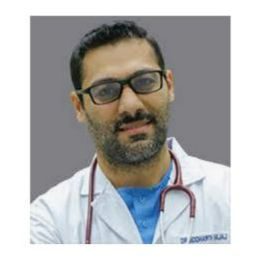Understanding High Cholesterol Levels: Causes, Risks And Management
Learn about the causes, risks, and management of high cholesterol levels. Understand how elevated cholesterol affects your health and steps to control it for a healthier life.

Written by
Last updated on 3rd Jul, 2025
Introduction
Cholesterol, a waxy substance found in your blood, is essential for building healthy cells. However, high levels of cholesterol can increase your risk of heart disease. High cholesterol leads to the development of fatty deposits in your blood vessels, making it difficult for blood to flow through your arteries. This, in turn, can result in heart attacks, strokes, and other cardiovascular diseases. This article provides an in-depth look into high cholesterol levels, including their causes, risks, and management strategies.
What Are High Cholesterol Levels?
High cholesterol levels refer to an elevated amount of cholesterol in the blood, specifically an excess of low-density lipoprotein (LDL) cholesterol, commonly known as "bad" cholesterol. Cholesterol is a fatty substance that is essential for various bodily functions, including the production of hormones, vitamin D, and bile acids for digestion. However, when cholesterol levels become too high, it can lead to serious health problems.
Cholesterol is carried in the bloodstream by lipoproteins, which are protein-lipid complexes. There are two primary types of lipoproteins involved in cholesterol transport:
Low-Density Lipoprotein (LDL): Often referred to as "bad" cholesterol, LDL carries cholesterol from the liver to the cells and tissues. When there is an excess of LDL cholesterol, it can accumulate on the walls of blood vessels, leading to the formation of fatty plaques. Over time, these plaques can narrow and harden the arteries, a condition known as atherosclerosis, which increases the risk of heart disease, stroke, and peripheral artery disease.
High-Density Lipoprotein (HDL): Known as "good" cholesterol, HDL helps remove excess cholesterol from the bloodstream by carrying it back to the liver for processing and elimination. Higher levels of HDL cholesterol are associated with a lower risk of cardiovascular diseases, as HDL helps prevent the buildup of plaque in the arteries.
Causes of High Cholesterol Levels
High cholesterol levels can result from a variety of factors, including lifestyle choices, underlying medical conditions, and genetic predisposition. Below are the primary causes:
1. Unhealthy Diet
A diet high in saturated fats, trans fats, and dietary cholesterol can raise the levels of low-density lipoprotein (LDL) cholesterol, known as "bad" cholesterol, in the bloodstream.
Saturated fats, found in red meat, butter, cheese, and full-fat dairy products, increase LDL cholesterol.
Trans fats, present in processed foods, fried items, and baked goods, not only raise LDL cholesterol but also lower high-density lipoprotein (HDL) cholesterol, the "good" cholesterol.
Dietary cholesterol found in foods like eggs and shellfish can affect cholesterol levels, although to a lesser degree than saturated and trans fats.
2. Physical Inactivity
A sedentary lifestyle can contribute to weight gain and poor cholesterol balance. Regular lack of physical activity leads to higher levels of LDL cholesterol and lower levels of HDL cholesterol.
3. Obesity
Excess body weight, particularly abdominal fat, is closely linked to elevated cholesterol levels. Obesity increases the production of LDL cholesterol and triglycerides, while also lowering HDL cholesterol.
4. Smoking
Smoking has a detrimental effect on cholesterol levels. It lowers HDL cholesterol and damages the walls of blood vessels, making it easier for cholesterol to accumulate and form plaques. This increases the risk of atherosclerosis and cardiovascular disease.
5. Genetics
Genetics play a significant role in cholesterol levels. Familial hypercholesterolemia, a genetic disorder, causes extremely high levels of LDL cholesterol. Individuals with a family history of high cholesterol are more likely to inherit high cholesterol levels, even if they maintain a healthy lifestyle.
6. Age and Gender
Cholesterol levels tend to increase with age. Both men and women experience this rise, but it usually occurs earlier in men. In women, menopause often triggers an increase in LDL cholesterol levels due to hormonal changes.
7. Underlying Medical Conditions
Certain medical conditions can lead to elevated cholesterol levels:
Diabetes: High blood sugar levels can increase LDL cholesterol and triglycerides while lowering HDL cholesterol.
Hypothyroidism: An underactive thyroid can impair the body’s ability to process cholesterol, leading to higher cholesterol levels.
Kidney Disease: Chronic kidney disease can result in abnormal lipid metabolism and elevated cholesterol.
Liver Disease: Since the liver plays a key role in processing cholesterol, liver dysfunction can lead to increased cholesterol levels in the blood.
8. Medications
Some medications can contribute to higher cholesterol levels. For example, certain diuretics, beta-blockers, and steroids may raise cholesterol and triglyceride levels, especially when used long-term.
Symptoms of High Cholesterol Levels
One of the key dangers of high cholesterol levels is that they typically do not present symptoms. Many individuals remain unaware of their high cholesterol until they undergo a blood test or experience a serious cardiovascular event, such as a heart attack or stroke. Because of this, regular cholesterol screening is essential for early detection and effective management.
Risks Associated with High Cholesterol Levels
High cholesterol levels—especially elevated low-density lipoprotein (LDL) cholesterol, or "bad" cholesterol—pose significant risks to cardiovascular health and overall well-being. When cholesterol levels are too high, it can lead to a variety of serious health complications. Below are the primary risks associated with high cholesterol:
1. Atherosclerosis (Plaque Buildup in the Arteries)
One of the most concerning risks of high cholesterol is atherosclerosis, a condition where cholesterol, fats, and other substances accumulate on the walls of arteries. This buildup forms plaques, which can narrow and harden the arteries, restricting blood flow. Atherosclerosis increases the risk of:
Heart disease: Reduced blood flow to the heart can cause chest pain (angina) or a heart attack.
Stroke: Plaques can block blood flow to the brain, leading to a stroke.
Peripheral artery disease (PAD): Reduced blood flow to the limbs can cause pain and, in severe cases, tissue damage.
2. Heart Attack
High cholesterol levels, particularly elevated LDL cholesterol, are a major risk factor for heart attacks. Plaques formed from cholesterol buildup in the coronary arteries can rupture, leading to the formation of blood clots. These clots can completely block blood flow to the heart muscle, causing a heart attack. Without prompt treatment, a heart attack can result in permanent heart damage or death.
3. Stroke
Similar to a heart attack, a stroke occurs when blood flow to a part of the brain is interrupted. High cholesterol contributes to the formation of plaques in the arteries, including those supplying the brain. When these plaques rupture, they can cause a blood clot, which can block a cerebral artery, leading to a stroke. A stroke can cause permanent brain damage, disability, or death, depending on its severity.
4. High Blood Pressure (Hypertension)
High cholesterol levels can also contribute to high blood pressure. When arteries become narrowed and stiff due to plaque buildup, the heart has to work harder to pump blood through them, which increases blood pressure. Over time, high blood pressure further damages the arteries and can exacerbate the risk of heart disease and stroke.
5. Heart Failure
Chronic high cholesterol can contribute to the development of heart failure. This occurs when the heart is unable to pump blood effectively to meet the body’s needs. Atherosclerosis and heart attacks caused by high cholesterol can weaken the heart muscle, impairing its ability to function properly.
6. Kidney Disease
Prolonged high cholesterol can affect the blood vessels that supply the kidneys, leading to kidney disease. Atherosclerosis in the renal arteries can reduce blood flow to the kidneys, impairing their ability to filter waste and regulate fluid balance. This can lead to kidney dysfunction or even kidney failure in severe cases.
7. Cognitive Decline and Dementia
Emerging research suggests a link between high cholesterol levels, particularly in midlife, and cognitive decline in older age. High cholesterol may contribute to the development of Alzheimer’s disease and other forms of dementia by promoting the buildup of beta-amyloid plaques in the brain. These plaques interfere with normal brain function and contribute to memory loss and cognitive impairment.
8. Increased Risk of Blood Clots
High cholesterol contributes to the formation of plaques that can rupture and lead to the formation of blood clots. These blood clots can travel through the bloodstream and block smaller blood vessels, increasing the risk of serious complications, including:
Pulmonary embolism: A clot that travels to the lungs, blocking blood flow and causing respiratory distress.
Deep vein thrombosis (DVT): A blood clot that forms in the deep veins, typically in the legs, which can break loose and travel to the lungs.
9. Gallstones
High cholesterol levels may also increase the risk of developing gallstones, which are hardened deposits of cholesterol that form in the gallbladder. Gallstones can block bile ducts and cause pain, infection, or even require surgery for removal.
Managing High Cholesterol Levels
Managing high cholesterol often requires a combination of lifestyle changes and medications. Here are some strategies to help manage and lower cholesterol levels:
1. Healthy Diet
Reduce Saturated Fats: Limit intake of red meat, full-fat dairy products, and processed foods.
Avoid Trans Fats: Found in margarines and store-bought cookies, crackers, and cakes.
Eat Heart-Healthy Foods: Incorporate more fruits, vegetables, whole grains, and lean proteins into your diet.
Increase Omega-3 Fatty Acids: These are found in fish, flaxseeds, and walnuts and can help lower bad cholesterol levels.
Add Soluble Fiber: Foods like oats, beans, and lentils can reduce the absorption of cholesterol in your bloodstream.
2. Regular Exercise
Engaging in at least 30 minutes of exercise most days of the week can help raise HDL cholesterol while lowering LDL cholesterol and triglycerides. Activities like walking, jogging, swimming, and cycling are excellent options.
3. Maintain a Healthy Weight
Losing excess weight can help lower cholesterol levels. Even a modest weight loss can have a significant impact.
4. Quit Smoking
Quitting smoking improves your HDL cholesterol levels and benefits your heart health in numerous other ways.
5. Medications
For some individuals, lifestyle changes alone may not be enough to manage high cholesterol. Medications may be prescribed, including:
Statins: Help lower LDL cholesterol by blocking a substance your liver needs to make cholesterol.
Cholesterol Absorption Inhibitors: Reduce the amount of dietary cholesterol absorbed by the intestines.
Bile Acid Sequestrants: Help the body use excess cholesterol to make bile acids, reducing cholesterol levels in the blood.
PCSK9 Inhibitors: Help the liver absorb more LDL cholesterol, lowering the amount in your blood.
6. Regular Monitoring
Regular check-ups with your healthcare provider are crucial for monitoring cholesterol levels and adjusting treatment plans.
Get Your Cholesterol Levels Checked
Conclusion
High cholesterol levels are a significant risk factor for cardiovascular diseases, but they can be managed effectively with the right approach. By adopting a heart-healthy lifestyle, staying active, maintaining a healthy weight, and following your healthcare provider's recommendations, you can lower your cholesterol levels and reduce the risk of heart disease and stroke.
Understanding the causes, risks, and management strategies for high cholesterol empowers individuals to take proactive steps towards better heart health. If you suspect you have high cholesterol or have been diagnosed with it, consult with your healthcare provider to develop a personalised plan that works best for you.
Consult Top Cardiologist
Consult Top Cardiologist

Dr. Dayanashre N
General Physician
3 Years • MBBS
Bengaluru
PRESTIGE SHANTHINIKETAN - SOCIETY CLINIC, Bengaluru

Dr. Prashant Ramdas Wankhade
Cardiologist
8 Years • MBBS, MD - General Medicine, DNB - Cardiology
Bengaluru
Apollo Medical Center, Marathahalli, Bengaluru

Dr. Anand Ravi
General Physician
2 Years • MBBS
Bengaluru
PRESTIGE SHANTHINIKETAN - SOCIETY CLINIC, Bengaluru

Dr. Bhethala Sharan Prakash
General Physician/ Internal Medicine Specialist
5 Years • MBBS MD
Bengaluru
PRESTIGE SHANTHINIKETAN - SOCIETY CLINIC, Bengaluru

Dr. Siddharth Bajaj
Cardiologist
10 Years • MBBS, M.D. D.M. (Cardiology)
Hyderabad
Apollo Hospitals Jubilee Hills, Hyderabad
Get Your Cholesterol Levels Checked
₹250(₹625)60% off


 (1).webp)